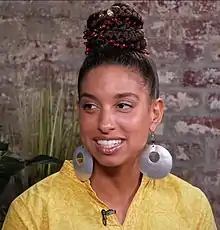Leah Penniman
Leah Penniman (c.1980) is a farmer, educator, author, and food sovereignty activist.[1] Penniman is Co-Founder, Co-Director and Program Manager of Soul Fire Farm, in Grafton, New York.[2]

Biography
Leah Penniman was born to Reverend doctor Adele Smith Penniman, a Haitian black American pastor and activist, and a white father. Penniman was raised in central Massachusetts with two siblings as the only family of color after the parents split and Adele moved to Boston.[3][4] Penniman began farming at age 16, working with The Food Project in Boston in 1996 when staying with her mother.[3][5][6] Penniman received an MA in Science Education and BA in Environmental Science and International Development from Clark University.[5] After graduation, Penniman lived in a food desert in Albany, New York and was on WIC after giving birth. This experience led Penniman to see the need for food sovereignty in Black and Brown communities.[3]
In 2006, Penniman purchased 72-acres of land in Grafton, New York to co-found Soul Fire Farm and the farm officially opened in 2011. The name is taken from the song Soulfire by Lee “Scratch” Perry and originally focused on a farm share for low-income people.[3] As Soul Fire Farm has grown, its mission is to end racism and injustice in the food system and by reclaiming the inherent right to belong to the earth and to have agency in the food system as Black and Brown people.[5] The farm's flagship program is the Black Latinx Farmers Immersion, a 50-hour course to train beginner farmers. By 2018, 500 individuals had taken the course.[6]
Penniman has been farming since 1996 and teaching since 2002. Penniman has worked at the Food Project, Farm School, Many Hands Organic Farm, Youth Grow and with farmers internationally in Ghana, Haiti, and Mexico.[5] Penniman has also worked as a science teacher at University Park Campus School, Tech Valley High School, and Darrow School and was founding director of the Harriet Tubman Democratic High School.[7]
In 2018, Penniman published Farming While Black, a book designed to create sustainable, equitable, profitable, and dignified relationships with food historically disenfranchised communities eat, and the land it comes from.[6]
Recognition
The work of Penniman and Soul Fire Farm has been recognized by the Soros Racial Justice Fellowship, Fulbright Program, Presidential Award for Science Teaching, NYS Health Emerging Innovator Awards, and Andrew Goodman Foundation, among others.[8]
In 2019, Penniman was awarded the James Beard Foundation Leadership Award for facilitating food sovereignty programs.[9]
Publications
- 2020: To free ourselves we must feed ourselves. Rapid Response Opinion, Agriculture and Human Values (published 11 May)
- 2018: Farming While Black: Soul Fire Farm’s Practical Guide to Decolonizing Land, Food, and Agriculture. Chelsea Green Publishing (November 8, 2018)[10]
- 2018: Uprooting Racism, Seeding Sovereignty. Schumacher Center for a New Economics.
- 2018: Sowing the Seeds of Food Justice: A Guide for Farmers Who Want to Supply Low Income Communities While Maintaining Financial Sustainability, SARE Research Manual
- 2017: Land Justice, published by Food First. Contributing author.
- 2017: Perma/Culture, published by Routledge. Contributing author.
- 2017: Cherry Bombe Cookbook, published by Clarkson Potter, Contributing author.
- 2017: 4 Not-So-Easy Ways to Dismantle Racism in the Food System. YES! Magazine
- 2016: At Soul Fire Farm #blacklivesmatter and #black land matters, Fortune Magazine
- 2016: After a Century of Decline, Black Farmers on the Rise YES!Magazine
- 2015: USDA Puts $34.3 million into local food, but is it enough?YES! Magazine
- 2015: Four Ways Mexico’s Indigenous Farmers are Practicing the Agriculture of the Future. YES! Magazine
- 2015: Living and Learning in Oaxaca, New York Organic News, Volume 33, No 1, Spring
- 2015: Radical Farmers Use Fresh Food to Fight Racial Injustice.YES! Magazine (Republished in Solutions Journal) 2014: Black and Latino Farmers Immersion. YES! Magazine (Republished 2015 in Urban Food Stories)
Personal life
Penniman identifies as genderqueer/multigender.[11] Penniman lives on the farm with a partner, Jonah Vitale-Wolff and their two children, Neshima and Emet Vitale-Penniman.[7]
References
- Meiers, Andrea (2017). "Growing a Relationship With the Land". Country Woman Magazine. Retrieved 13 April 2018.
- Henry, Sarah (2014-12-02). "This Farmer Wants to Help Youth of Color Reconnect With the Land". Civil Eats. Retrieved 13 April 2018.
- "Farming's badly needed 'Blackstension agent'". www.dirt-mag.com. Retrieved 2020-09-22.
- Phillips, Kynala (2020-08-19). "Gardening as a Radical Act". Wall Street Journal. ISSN 0099-9660. Retrieved 2020-09-22.
- Goppart, Judy. "issue_id":256699,"page":6} "Leah Penniman: Growing A New Generation of Farmers". HerLifemagazine.com. HERLIFE. Retrieved 13 April 2018.
- "Americans of color largely excluded from producing and eating fresh food". The Counter. 2018-11-08. Retrieved 2020-09-22.
- Goppert, Judy. "issue_id":256699,"page":24} "Leah Penniman: Growing a New Generation of Farmers". HerLifeMagazine.com. Her Life Magazine. Retrieved 13 April 2018.
- Popovitch, Trish. "10 Female Urban Farmers Setting the Tone for Sustainable Cities". Seedstock. Retrieved 13 April 2018.
- "2019 Leadership Award Winner Leah Penniman | James Beard Foundation". www.jamesbeard.org. Retrieved 2020-09-22.
- Penniman, Leah (2018-10-30). Farming While Black: Soul Fire Farm’s Practical Guide to Liberation on the Land. Chelsea Green Publishing. ISBN 978-1-60358-762-4.
- https://docs.google.com/document/d/13e5h2YQ98P_uStshda1xcvNNcOiNvB9jSU8g1LE7HUI/edit